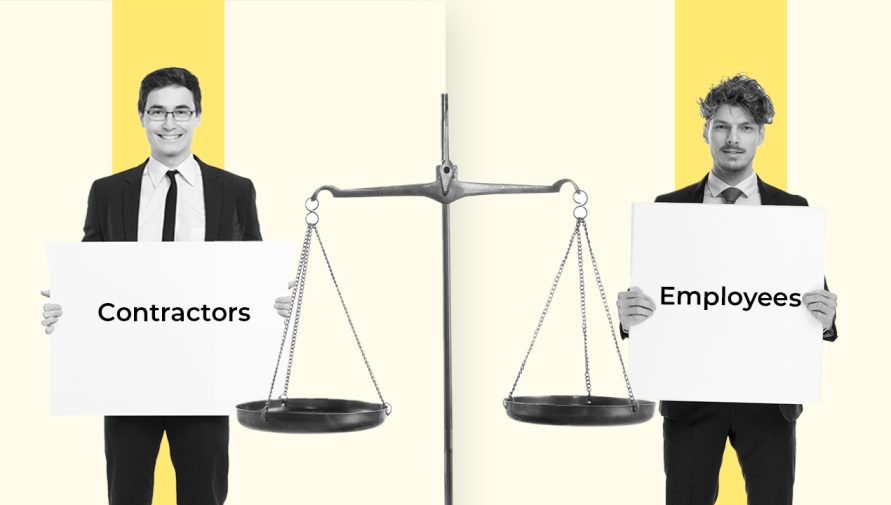Understanding the Legal Differences Between Employees and Contractors
- Kritika Verma
- December 11, 2024
- 6 Minute Read

To hire remote talent, you must understand the difference between employees and independent contractors. Misclassifying contractors as employees can lead to legal challenges and financial penalties.
Here is an elaborate overview that provides each classification’s definitions, key legal differences, and implications. Let us learn what an employee vs. independent contractor is and how to classify the workforce after understanding the legal differences.
What is an Employee Vs an Independent Contractor?

Let us understand the legal meaning and definition of employee vs contractor:
Meaning of an Employee
An employee is hired under the employer’s control and is required to follow specific schedules and procedures. They earn regular pay and are offered benefits like health insurance and pensions. Employers are obliged to withhold income taxes and pay Social Security and Medicare contributions to employees.
Meaning of an Independent Contractor
Workers who offer services as independent contractors are self-employed. They control their performance and normally work with their tools and resources. They pay their taxes and work on a contractual amount.
Legal Differences Between Employee Vs Contractor
Let us understand the key differences between the both:
- Employment Law Coverage – Employees are protected by various laws in employment while independent contractors are considered as business entities and not covered by these benefits.
- Taxation and Deductions-Employers withhold employees’ federal and state taxes, while independent contractors receive full pay for their services and are responsible for their tax remittances. They are also allowed certain deductions based on business expenses incurred.
- Working Hours and Schedule—Employers set employees’ work hours and timetables. Independent contractors can set their working hours and are liable for completing work within the timeline.
- Benefits and Leave Entitlement – Employees may receive health insurance, retirement plans, paid leave, and other perks as part of their compensation package. Independent contractors are not entitled to these benefits.
- Termination Rights – Employees are protected against unjust termination according to law and may be entitled to severance pay. Independent contractors operate under the terms of their contract, which includes the conditions for termination of work.
Legal Differences and IRS Rules Contractor Vs. Employee

Before hiring IT talent, you must understand the basic legal differences between an employee and a contractor. Let’s dig in:
1. Contractual Relationship
Employees have formal contracts stating what they will do, their responsibilities, and benefits. Usually, it specifies details such as working hours and entitlements, like paid leave, health insurance, and termination conditions.
Contractors enter project-specific agreements that detail the scope of work, deadlines, and payment terms. These agreements focus on deliverables and give contractors more flexibility in accomplishing tasks.
Flexibility in Work Arrangements-Employees work according to a set routine and must conform to corporate rules, so there is little room for flexibility. Contractors, on the other hand, enjoy flexibility, especially for remote IT positions. They determine where and when to work and must deliver within agreed-upon timelines.
2. Control and Autonomy
A business controls an employee’s work. It determines how work should be done, supplies tools and training, and tracks progress. In the case of independent contractors, a business can only control the result, not the process. Contractors are responsible for delivering results.
Independence in Work Methods and Tools—Employees depend on the employer’s tools, software, resources, and systems. The business incurs expenses for equipment and software; therefore, the employee must live up to organizational expectations. Contractors work independently, mostly with their equipment and expertise. This helps businesses reduce overall costs.
3. Payment and Compensation
The employees earn a fixed or hourly wage based on their agreed-upon work schedule. Remuneration is also regular and consistent and may include additional benefits such as overtime pay, bonuses, or commissions. Contractors are paid according to the terms of their agreement. This could be based on a project, milestone, or hours worked. The negotiability of their rates depends on their experience level and the scope of their project.
Contractor Invoicing-Independent contractors create invoices for payment. Invoices include services provided, the number of hours of work, the agreed-on rate, and the pay date.
4. Worker Classification/Misclassification
Misclassifying employees as independent contractors negatively impacts businesses. In case a business has misclassified an employee as a contractor, it must pay taxes, social security, Medicare, etc.
Employees who are misclassified as independent contractors can file a worker classification determination with the IRS. After the determination, they can apply for Form 8919 to compute and pay the unpaid Social Security and Medicare taxes on their earnings.
Voluntary Classification Settlement Program—The VCSP is an elective program through which employers can reclassify workers as employees. Qualified businesses that agree to treat workers as employees receive partial relief from federal employment taxes. To participate, businesses must be qualified, submit Form 8952, and agree with the IRS.
Misclassification can lead to financial and reputational risks for the business. Some of these risks include:
- The employer may be penalized for not withholding taxes for misclassified employees.
- An employee who is denied benefits can file a legal claim.
- A wrongly classified worker may file a legal claim with the employer, and this can give rise to costly disputes
Legal Implications of Misclassification
- Fines and Penalties
- Expensive Lawsuits
- Reputational Damage
5. Legal Protections and Rights
Employees have solid protections under the federal and state labor laws, which include:
- According to the Fair Labor Standards Act (FLSA), employees should be paid minimum wage and compensated with overtime.
- No discrimination will be tolerated in the workplace for any factor specifically mentioned under laws such as Title VII of the Civil Rights Act.
- Employees may be eligible for perks like health insurance, paid sick leave, vacation days, and contributions to retirement plans.
- Unemployment benefits cover employees who are terminated. They are also eligible for workers’ compensation if injured at work.
- Employees cannot be fired without just cause. This gives them more security at work.
Contractor Rights and Legal Protections
Independent contractors, too, are entitled to major rights through contract and commercial law:
- Freedom of Negotiation-Contractors can negotiate their rates, terms, and conditions, which gives them control over their earning potential.
- Payment Protection-Contractors can claim the right to be paid according to the terms of the agreements. Non-adherence can lead to legal action.
- Tax Benefits- The business expenditures are subtracted from the income, thus reducing taxable income for contractors.
Best Employer Practices
Here is what an employer should know before hiring an employee vs a contractor:
- Determine the extent of work – If the project is ongoing, leaders can hire an employee. Businesses must hire a contractor for project-based work or work requiring specialized skills.
- Assess your control needs – Employees are your best choice if you need to dictate how work gets done.
- Determine your costs – Contractor pay could be lower than the employee’s salary. It excludes extra benefits, and businesses can save on operational costs incurred by employees.
- Review IRS Guidelines – Classify workers using the IRS’s three criteria: behavioral control, financial control, and nature of the relationship.
Tips on Proper Classification of Workers
- Draft Clear Contracts- A contractor’s contract must detail the project’s scope, deadlines, payment terms, and expectations. The contract should include detailed terms regarding employees’ roles, benefits, and responsibilities.
- Avoid treating contractors like employees – Do not schedule them, offer training, or supply tools.
- Seek legal advice –Use the expertise of employment law attorneys to review the classifications and avoid potential liabilities.
- Review classifications regularly – Regularly check for compliance with changing laws and IRS standards.
Conclusion
To hire remote talent, it is necessary to understand the classification and IRS rules related to employee vs contractor. Both hiring depends on the organizational objectives, scope of job duties, and compliance needs.
Knowing the legal differences helps businesses create compliant teams using proper practices while promoting healthy working relationships.
Proper worker classification is a legal requirement and a step toward equitable, accessible, sustainable, and ethical business practices.
Frequently Asked Questions
What are the key differences between an employee and a contractor?
Ans: The major differences between an employee and an independent contractor relate to control, benefits, and tax obligations. Employees perform under the employer according to a set schedule and prescribed tasks. Employees get benefits, while contractors don’t. Employers are liable to withhold taxes and pay Social Security and Medicare contributions for employees but not for contractors.
How can someone be classified as an employee or a contractor?
Ans: Three criteria are mainly used in determining a contractor against an employee based on the IRS rule. If the company determines the methods and means for performing work, then the worker is an employee. Contractors manage their expenses, payments, and taxes. If the role has entitlements such as benefits and paid leave, it is an employee. But if it’s project-based, it is a contractor.
What legal protections do employees benefit from that contractors do not?
Ans: Employees get legal protections under labor laws that contractors don’t. For example, minimum wage and overtime pay rights, anti-discrimination laws, and benefits such as holiday pay, overtime, sick leave, retirement contributions, etc.
Can an independent contractor become an employee?
Ans: Yes, if the working relationship changes, the independent contractor can be converted into an employee. When businesses hire remote talent for long-term projects or if a contractor’s work resembles an employee’s, the company must reclassify the worker as an employee to avoid penalties.









